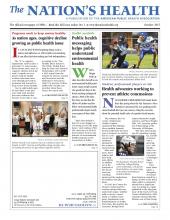Giving up smoking following a heart attack improves not only physical health but mental health, too, according to a recent study.
Patients who quit smoking one year after a heart attack had better mental health than people who continued smoking after theirs, according to research published online Aug. 25 in Circulation: Cardiovascular Quality and Outcomes.
“It was very exciting to see that quitting in the first year after a heart attack had a profound effect on quality of life,” said senior study author Sharon Cresci, MD, an assistant professor of medicine and of genetics at the Washington University School of Medicine in St. Louis. “Some patients feel like there’s not a lot they can do to change their outcome after a heart attack, that they had this life-threatening event and say, ‘What can I do to make things better?’ The fact (that) we can offer smokers this data and say that even at the point of having a heart attack, by quitting smoking you can change some pretty significant things and improve the way you feel day-to-day is a positive message we can give.”
The study looked at more than 4,000 patients who were hospitalized for heart attacks across more than 40 U.S. hospitals. Participants were asked about their smoking status and health-related quality of life when they entered the hospital and again at one month, two months and one year after their heart attack, the study said.
At the time of their initial heart attack, 29 percent of patients said they never smoked, 34 percent quit prior to the heart attack and 37 percent smoked within a month of their heart attack, the study said. Of the 37 percent who were smoking, 46 percent quit smoking within the year of follow-up, while 54 percent were still smoking after a year, the study said.
The 54 percent that continued to smoke had more chest pain — known as angina — and worse mental health status than all other groups. Patients who continued to smoke fared worse even after adjusting for health-related quality of life factors, such as having insurance to cover medications and not making enough money to make ends meet.
The 46 percent who quit smoking in the following year had an intermediate level of angina and mental health status, but still fared better than patients who continued smoking after a heart attack, the study said.
From a public health standpoint, more physicians need to get the message out about the effects of smoking after a heart attack and make sure their patients are informed, Cresci said. She said she hopes to see more studies like hers look at large numbers of patients and how smoking can affect health issues such as angina.
“Patients are very intelligent and they’re advocating for themselves,” Cresci said. “They’re going online. They’re searching for this information and the fact this information is available to the public is important.”
For more information, visit http://circoutcomes.ahajournals.org/content/early/2015/08/25/CIRCOUTCOMES.114.001545.full.pdf+html.
- Copyright The Nation’s Health, American Public Health Association









